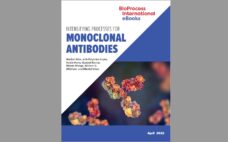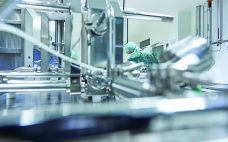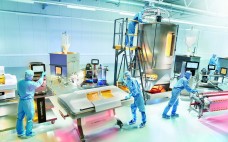The commercial manufacturing success of monoclonal antibodies (MAbs) has become a touchstone of the biopharmaceutical industry. MAbs are so well established that they often are referred to as “traditional” biologics, and well-known MAb processing methods have become a model for processing of other “advanced” or “emerging” therapies. But MAb processing continues to advance as biomanufacturers seek ways to improve efficiencies, lower costs, and (most recently) increase sustainability of facilities. Drug makers are particularly interested in strategies for MAb process intensification.…
Author Archives: Miriam Monge
Making Downstream Processing Continuous and Robust: A Virtual Roundtable
Current biomanufacturing is driven to pursue continuous processing for cost reduction and increased productivity, especially for monoclonal antibody (MAb) production and manufacturing. Although many technologies are now available and have been implemented in biodevelopment, implementation for large-scale production is still in its infancy. In a lively roundtable discussion at the BPI West conference in Santa Clara, CA (11 March 2019), participants touched on a number of important issues still to be resolved and technologies that are still in need of…
Single-Use Production Platforms for Biomanufacturing
The pipeline of biopharmaceuticals remains strong, and the market for biologics could exceed US$450 billion by 2025. Analysts predict that sales within segments such as regenerative medicine and antibody–drug conjugates (ADCs) will grow faster than 20% each year. Yet considerable challenges remain for biopharmaceutical companies to overcome if they wish to be successful. First, they must reach the market quickly. Analysis by the Boston Consulting Group shows that the proportion of available value that a newly launched product can capture…
The 2017 World Biological Forum: Successes and Future Trends in Continuous Biomanufacturing
Continuous biomanufacturing was a central topic at the fourth annual World Biological Forum in Oxford, UK, on 26–28 June 2017. A well-rounded lineup of presenters appeared at this forum held in Oxford University’s Lady Margaret Hall, an eclectic location that well captured the historic charm of the university. Delegates were well supported throughout the meeting with generous meals, refreshments, and assistance provided by helpful staff. Papers were presented in Talbot Hall in the center of the college. The stately main…
Deciding on an Integrated Continuous Processing Approach: A Conference Report
Biopharmaceutical manufacturers are increasingly investigating or implementing continuous processes, and industry experts are participating in vibrant and healthy discussions on a wide range of process approaches being adopted. We seem to have entered a phase within the biopharmaceutical industry (which is often described as conservative) of intense bioprocess innovation as manufacturers strive to lower costs and provide agile, responsive supply chains for “drug on demand” continuous manufacturing operations. Senior industry leaders met in Berkeley, CA, in late 2015 at ECI’s…
Implementing Flexible, Scalable, and Cost-Efficient Bioprocess Platforms: A Proven Project Management Approach
Although significant scientific progress has been made in the biotechnology industry, it has lagged behind other sectors — such as aviation and automotive — in developing, scaling up, and industrializing products coming out of R&D. The goal is to implement robust and reliable manufacturing processes for good manufacturing practice (GMP) market supply cost-effectively. But manufacturing methods for biologics have remained unchanged for decades, with large-scale, capital-intensive stainless steel facilities taking three to five years to build and remaining both energy…
Entrepreneurship, Lessons Learned, and Bioindustry Perspectives: An Interview with Roger-Marc Nicoud
Roger-Marc Nicoud received his PhD from the University of Lorraine in process simulation for the nuclear industry. He joined Separex in 1987, first as a technical director and then as a managing director until 1995. Between 1993 and 1995, he also worked as professor and headed a research laboratory involved in thermodynamics at the University of Lorraine. Nicoud founded Novasep in 1995 with the objective of developing comprehensive solutions for producing biologic and synthetic molecules. Novasep became a leading life-sciences…
Creating Value Through Investment
During my MBA course, Professor Pierre Casse — then at the International Institute for Management Development (IMD) in Lausanne, Switzerland — regularly reminded us that one key to success was constantly finding new ways to “delight and inspire your clients” by creating value. SAFC achieved that objective in its “Overcoming Supply Chain Vulnerability and Lowering Risk in Biopharmaceutical Manufacturing” symposium 17–18th June 2014 in Turnberry, Scotland. Along with a day of industry insight, the event included a visit and tour…
Optimizing for the Future
The 2013 biennial meeting of the European Society for Animal Cell Technology (ESACT) was in Lille, France this past June. While there, BPI editorial advisor Miriam Monge (vice president of Biopharm Services Ltd.) interviewed ESACT executive committee member Hitto Kaufmann, PhD (vice president of biopharmaceutical process sciences for Boehringer Ingelheim). They talked about some scientific developments being discussed at this year’s ESACT conference as well as Boehringer Ingelheim’s recent announcement about setting up in China and Kaufmann’s own thoughts on…
A Sustainable, Single-Use Facility for Monoclonal Antibody Production
Pierre Fabre, the second largest independent pharmaceutical group in France, recently opened a new facility to expand its monoclonal antibody (MAb) production for clinical supply. The Antibody Biotechnology Unit (ABU) facility was designed to provide needed flexibility for adapting to various process and capacity changes, so it includes state-of-the-art single-use technologies. The facility was also built with sustainability in mind to minimize the company’s environmental footprint. The company integrated this plant into an existing antibody research and development (R&D) center,…





